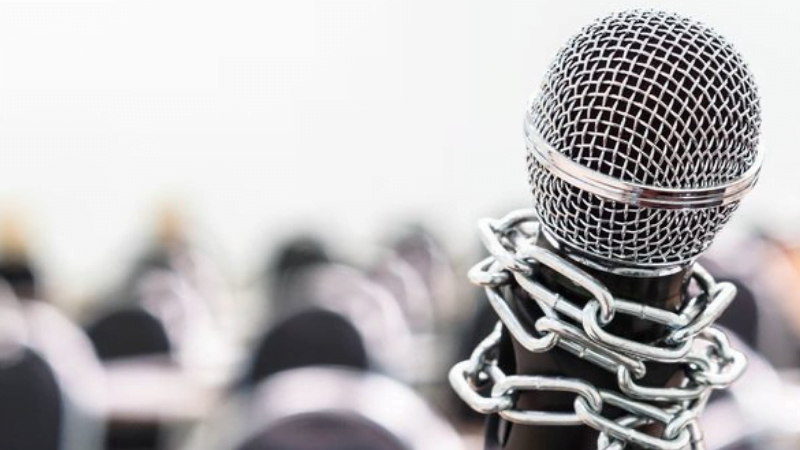Vexatious lawsuits are a significant concern and impediment for European journalists, along with media bashing from politicians, spyware, disinformation and social and economic insecurity, according to a new report from the Council of Europe (CoE).
‘Press Freedom in Europe: Time to Turn the Tide’ presents an annual assessment of press freedom in Europe with the involvement of the Safety of Journalists Platform and its partner organisations, including Article 19, Reporters Without Borders, the Committee to Protect Journalists, the International Press Institute, and the European Centre for Press and Media Freedom, among others.
Listing a number of threats to Europe’s media landscape, it calls for action from member states, the CoE itself, and the European Commission, including appointing a Commission vice president to take ownership of issues relating to media freedom.
The issue of SLAPPs
“SLAPPs (Strategic Lawsuits Against Public Participation) are a major concern and impediment, especially for journalists investigating corruption, conflicts of interest and financial crimes,” the report states, reminding lawyers of their “obligation to integrity, discouraging them from taking on cases which appear to be SLAPPs.”
The report nodded to a number of SLAPPs in Serbia, Slovakia, the Netherlands, France, Poland, Turkey, and Italy. Malta, particularly the 40 legal challenges filed by the government against The Shift, were not mentioned in this year’s report as they were initiated in 2022. The cases are still ongoing.
“Despite the efforts to reduce their effects, vexatious lawsuits remain one of the major threats against journalism in the public interest. They continue to intimidate journalists and at times to deter them from covering abuses and failings which participate in the democratic backsliding in Europe,” it notes.
But it was not all bad news. The report notes how, in 2023, various positive initiatives were taken, which testify to a growing awareness by governments of the threat to democracy that SLAPPs represent.
In particular, this included the EU anti-SLAPP directive, which “added pressure on member states to adopt stronger legislation against abusive litigation.”
This should be seen as a “minimum requirement” that should be implemented alongside “ambitious measures to address the prevalence of such lawsuits at a national level.”
It also noted the drafting of the CoE’s anti-SLAPP recommendation, the adoption of the European Media Freedom Act, and changes to rules at national levels, which “testify to the commitment of a significant number of governments to enhance press freedom and protect journalists, even if the fruits of that public commitment are in too many cases still awaited.”
Media bashing by politicians
Aside from vexatious lawsuits, the report noted the threat of “media bashing by politicians, which may be used as an alibi for violence against journalists.”
During 2023, journalists from throughout CoE member states were subjected to verbal abuse and smear campaigns by politicians that “undermine the credibility of journalists who suffer in some countries from low levels of public trust and often have the effect of compromising journalists’ safety”, the report stated.
It also contributes to a “hostile atmosphere” where law enforcement, magistrates, and even public opinion may feel justified to treat journalists as criminals, liars or traitors. It also said this could deter parliamentarians from enacting protective measures for the media as they would be seen supporting an “unpopular profession”.
Again, echoing problems seen in Malta, journalists’ economic and social insecurity was highlighted in the report. This insecurity “exerted pressure on the capacity of journalists to perform their missions according to the highest professional and ethical standards”. This is felt in the print and audio-visual sector as advertising revenue decreases.
Economic abuse
“Employment and salary conditions of journalists deteriorated, particularly for freelancers,” the CMPF, a partner organisation, concluded in the report.
It also found that economic insecurity leads to media capture as it “asserts control by stealth,” using apparently legal means to “create economic and regulatory barriers to independent media, limiting their ability to generate income, operate and inform the public”.
The report continued that these economic barriers are “A popular tool of authoritarian and populist governments for controlling public information”.
Action needed
The report calls on the institutions of the European Union to ensure member states ambitiously transpose and implement the European Media Freedom Act (EMFA) to better safeguard media pluralism and independence at a national level.
The Anti-SLAPP Directive should also be implemented effectively to better protect journalists at the national level from lawsuits designed to silence their reporting.
The European Commission’s Rule of Law report should also be strengthened to develop coordination and communication with civil society and include measurable recommendations that will serve as benchmarks for improvements in member states.
It also asks the Commission to call out member states who do not pull their weight regarding measures taken to protect journalists while praising and highlighting those that enforce positive measures.
The Commission should also investigate the unjustified deployment of spyware against journalists in the EU and seek to make legislative proposals to respond to it.
In 2023, it was revealed Malta was among a handful of states lobbying the EU to retain wording in the EMFA that would allow the use of spyware on journalists in the case of national security. While they eventually backed down, while publicly denying any lobbying, they were still slammed by media organisations for their stance.
It also suggests the establishment of a Commission vice-president with a clear press freedom mandate and the proper political commitment of resources, staffing and budget to oversee the area after the June 2024 European Parliament elections.
Member states have been urged to adopt national action plans on the safety of journalists and establish national journalist safety platforms or mechanisms.
They should also ensure the editorial independence of public service media, provide it with stable funding, and enable a robust governance system.
They must also review all laws and policies regarding SLAPPS, adopt comprehensive anti-SLAPP legislation that allows early dismissal of cases, impose the burden of proof on the plaintiff, and protect journalists against excessive penalties, among other recommendations.













